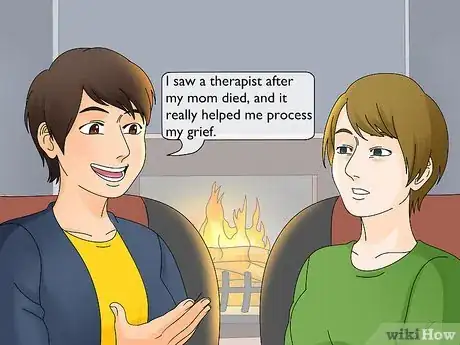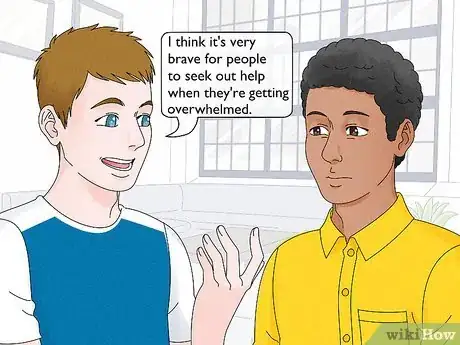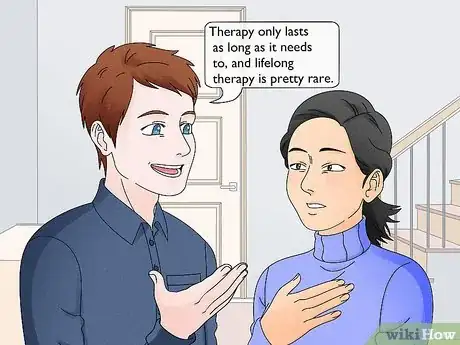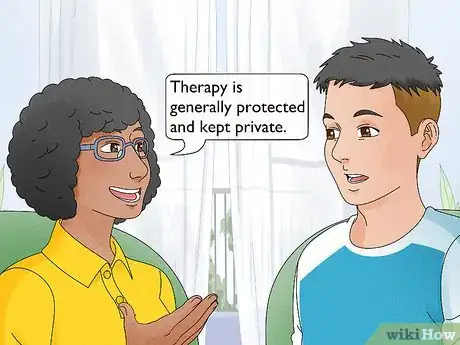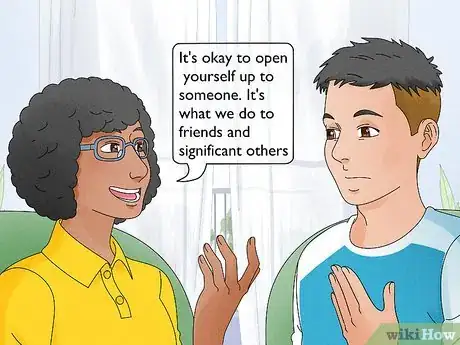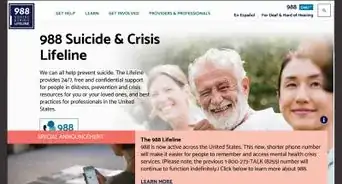This article was co-authored by Noel Hunter, Psy.D. Dr. Noel Hunter is a Clinical Psychologist based in New York City. She is the director and founder of MindClear Integrative Psychotherapy. She specializes in using a trauma-informed, humanistic approach for treating and advocating for people diagnosed with mental disorders. Dr. Hunter holds a BA in Psychology from the University of South Florida, an MA in Psychology from New York University, and a doctorate in Psychology (Psy.D) from Long Island University. She has been featured in National Geographic, BBC News, CNN, TalkSpace, and Parents magazine. She is also the author of the book Trauma and Madness in Mental Health Services.
There are 13 references cited in this article, which can be found at the bottom of the page.
This article has been viewed 122,778 times.
Therapy has been proven to help people of all ages with issues ranging from depression and anxiety to phobias and substance abuse problems.[1] Many people are hesitant or resistant to therapy for a number of reasons. If someone you know is in need of therapy, there are ways to broach the subject without causing unwanted shame or embarrassment for your friend or loved one. Knowing how to do so in an unobtrusive way is crucial to succeeding at getting your loved ones the help they need.
Steps
Introducing the Topic
-
1Be prepared to start from a place of caring and empathy. Your goal is to be as compassionate and nonjudgmental as possible, to encourage the person to take good care of themselves and get the help they need to feel better.
- Be prepared to listen and validate their feelings.
-
2Choose a good time and place. You'll want a quiet time of day, when you can talk one-on-one with the person when they aren't distracted by other tasks. Search for a time and place that is...
- Quiet, where there aren't distractions, and any tasks are automatic (e.g. folding laundry or doing dishes)
- Private, without eavesdroppers or other people to "gang up on" the person and overwhelm them
- Calm, where there aren't major tasks to complete, and nobody is feeling emotional, so the person can be more receptive
Advertisement -
3Tell them about what you've seen that concerns you. State what you've observed in the person, without adding judgments (e.g. "you're lazy") or armchair diagnoses (e.g. "you have anorexia"). Just state the patterns that have caught your eye and made you feel worried.
- "Anne, I've noticed you sleeping late and not eating much. When you do come out of your room, you move slowly and often have a big frown on your face."
- "Javier, I've seen you only eating small amounts of food for meals, and trying to hide it. I've also heard you make excuses a lot of times when people invite you to eat with them. Your face has gotten so much thinner these months."
- "I've noticed you wearing long sleeves a lot. Sometimes when you come out of your room, your eyes are puffy, and sometimes I catch glimpses of bandages on your arms."
-
4Emphasize your caring for them. Remind the person how much they matter to you, and that you care about your feelings. Sometimes, people get defensive when their mental health symptoms are spotted, and other times, people don't believe that they deserve help. It helps to remind them that you're bringing this up because their well-being matters to you.[2]
- "I love you, Anne, and it worries me to see you struggling so much. I've seen these new habits in you ever since your mom passed away. I know she meant so much to you, and I can tell you're struggling to cope."
- "Javier, you are so important to me, and it scares me to watch you taking up these habits. I couldn't imagine what I would do if you were hospitalized or gone from my life. You're too special to me."
- "I see these things, and I worry, because I love you and want you to be happy. And if you're not happy, then I want to do what I can to help make things easier on you. You're my child. Your feelings matter to me."
-
5Suggest therapy as a way to help. Therapy isn't a quick fix, but it can help make things better over time. If you have any experiences with therapy, talking about how it's helped you might be helpful as well.[3]
- "I want to help you as best as I can. I'm just not sure that I can offer enough for you. I think that a counselor may be able to help you gain some strategies for coping with this."
- "I would feel a lot better if you'd be willing to see a doctor or a therapist to get some help with this."
- "I saw a therapist after my mom died, and it really helped me process my grief. In fact, I kept going for about 2 years, and I learned a lot about myself."
-
6Offer help, if the person is receptive. If the person is ready to admit that they're struggling, they may feel lost or confused about how to make things better. Or, they may have some things that they want but aren't sure how to ask for. You can facilitate by asking what they need, and offering suggestions of things you'd be willing to do to help them.
- "What do you need?"
- "Would you like me to set up appointments with a few therapists, so you could try it out and pick the therapist who feels like the best fit?"
- "What if I handled the cooking for the next week?"
- "Would it help if I drove you there and back? You could talk to me as much or as little as you wanted on the way."
- "What could make your life easier?"
- "Would you like me to take you to the doctor? I could go in there with you for moral support, or I could hang back in the waiting room."
- "What if we took walks every evening to touch base and hang out?"
- (to someone who has agreed to an appointment) "Now, what can we do to help you hang in there until your first appointment?"
-
7Be patient and gentle with a reluctant person. Some people are afraid of therapy, or not ready to admit that they have a problem. Keep being there for them, helping them out, and showing them compassion.
- Remember, you can't force anyone to go to therapy if they aren't ready, so respect them if they say no.[4]
-
8Get help if you're worried about the person's safety. Depending on the type of illness and its severity, you may be worried that the person's life or safety is at risk.
- If the person is a child or teen, consider talking to their parent(s)/guardian(s), school counselor, or other trusted mentors if you see signs of mental illness. Adults can help intervene before the illness progresses too far.
- Call emergency services if you believe someone is going to hurt themselves. (In the US, be careful, as police may shoot people with mental illnesses, instead of helping.[5] )
Encouraging Someone Who Attaches Stigma to Therapy
-
1Tell your loved one that their feelings are understandable. Whether the person you're encouraging to see a therapist is suffering from a mental disorder, or addiction, or simply going through a hard time, telling your loved one that what she feels is normal is the first step to detaching therapy from stigmas.[6] Remind your friend or loved one that people of their age, gender, ethnicity, nationality, and people with their same struggle can and do attend therapy without stigma or shame.
-
2Consider reminding them that problems like these are related to medical conditions. Depression, anxiety, and phobias are all medical problems.[7] Addiction is also, at its root, a medical problem.[8] Everyone gets medical problems from time to time, and there is absolutely nothing wrong with seeking treatment.
- Try comparing therapy to seeing a doctor for any other medical condition. Ask your loved one, "You wouldn't avoid seeing a doctor for a heart or lung problem, right? So how is this any different?"
-
3Reiterate that getting help is common and normal. According to recent studies, 27% of adults in America have sought and received some type of treatment for mental health-related issues. That's more than one in four, on average, or about 80 million people.[9]
- Try saying something like, "I'm here for you, no matter what. I would not think any less of you for needing to get help."
-
4Let your loved one know that you support them and don't think less of them. It can help for them to have reassurance that you will still have the same respect for them. If you'd like, you can tell them that you think that seeking help is an act of courage.
- For example, if they say "I can do it myself. I'm not weak," then you might say "I think it's very brave for people to seek out help when they're getting overwhelmed. It's really courageous."
Encouraging Someone Who Is Afraid of Therapy
-
1Ask your loved one to pinpoint what they're afraid of. Getting your loved one to open up to you about specific fears and concerns may be a good first step toward getting that person to see a therapist.
- Try opening the conversation by admitting to some of your own fears and worries. This might make the dialogue feel like more of a conversation about fear and therapy, rather than a command to get help.
- If you have any other friends who have had success with therapy, consider citing that person as an example of how effective therapy can be.
- You can also ask your friend who has been through therapy to discuss their experiences with your loved on to help pacify their fears and to answer questions.
-
2Address each fear with logic. Sometimes, a gentle reality check can help people who are dealing with strong fears.[10] Here are some examples of things a person may worry about, and things you could say to reassure them:
- "What if I'm stuck in therapy forever?" "Therapy only lasts as long as it needs to, and lifelong therapy is pretty rare. For example, CBT normally lasts 10-20 sessions.[11] If you have a lot to work through and your therapist is really helping, it might take 1-2 years. Long-term therapy is usually for people with lifelong conditions like BPD or autism. And you can quit therapy anytime. You stop when you're ready to stop."
- "What about the cost?" "I can help you look for therapists who take insurance, or work for reduced fees based on need. There are resources, and I can help you look."
- "What if the therapist is mean or says I'm faking it?" "Most therapists are kind, helpful people. We can get you appointments with several therapists, and you can choose your favorite. If you somehow get a rotten therapist who is mean to you, you can leave and never see them again."
-
3Help your loved one find a therapist. Finding a therapist to meet your loved one's needs can be easily done online, or through a list provided by your loved one's insurance company.
- The American Psychological Association offers a free psychologist-locator service at http://locator.apa.org/.
-
4Offer to accompany your loved one to the office on the first visit. You may be able to sit in on the appointment (if your loved one is comfortable), or you can sit in the waiting room, where they can call for you anytime they need you. Having you with them in the car, and in the building, can help ease the transition to therapy.[12]
Encouraging Someone Who Worries About Being Vulnerable
-
1Let your loved one know about doctor-patient confidentiality. What your loved one says in therapy is generally protected and kept private.[13] Therapists are not supposed to disclose information without the patient's permission, except in cases where someone is in serious danger (e.g. the patient saying they will commit suicide).
- Remember that these laws differ by state and by country, but all therapists are required to disclose the details of confidentiality verbally and in writing. You can ask for a copy of their informed consent agreement prior to making the appointment.
-
2Ask your loved one what about vulnerability they find frightening. Reassure them that being scared of vulnerability is normal, and they're allowed to feel this way. If they're willing to be brave and do it, they may really benefit. According to recent surveys, nearly 89% of people feel somewhat better after having an emotional release like crying,[14] and doctors widely recommend talking about problems as a means of finding relief.[15] Here are things your loved one might say, and ways you can reassure them:
- "I'm scared to open up." "It's okay to open yourself up to someone. It's what we do to friends and significant others. You need to build a relationship with a therapist, and open honesty is the only way to do that."
- "What if they say it's my fault or that I'm faking?" "Therapists are trained to be helpful, patient, and kind. Most therapists are really good listeners and helpers. If you do get a bad one, then I promise you can leave and never come back."
- "I'm scared to face my feelings." "It's okay to be scared, especially of big feelings that you've been bottling up. You can take your time in therapy, and start small. Therapists are trained to help you deal with big feelings. And you can tell the therapist that you're scared of your feelings, so they can adjust things accordingly."
-
3Reassure your loved one that they can tell their therapist about their therapy-related fears. Your loved one can tell the therapist things like "I'm nervous about this and I don't know what to expect" or "I'm scared that you won't believe me," and the therapist can make adjustments accordingly. A good therapist can help them deal with those fears (and a bad one will likely show their true colors quickly).
-
4Remind your loved one about the potential outcome. The worst thing that could happen from going to therapy is that nothing will change. But the best-case scenario is that your loved one will find comfort, relief, and a new perspective on life.
- Reiterate to your friend or loved one once again that you care about her and are there for her, no matter what happens.
- Encourage your loved one to be open and honest with their therapist and explain to their therapist what is not working. The therapist may have a different approach to try or may help your loved one find a therapist who is be better suited to help them.
Expert Q&A
Did you know you can get expert answers for this article?
Unlock expert answers by supporting wikiHow
-
QuestionHow do you convince someone to go to therapy?
 Noel Hunter, Psy.DDr. Noel Hunter is a Clinical Psychologist based in New York City. She is the director and founder of MindClear Integrative Psychotherapy. She specializes in using a trauma-informed, humanistic approach for treating and advocating for people diagnosed with mental disorders. Dr. Hunter holds a BA in Psychology from the University of South Florida, an MA in Psychology from New York University, and a doctorate in Psychology (Psy.D) from Long Island University. She has been featured in National Geographic, BBC News, CNN, TalkSpace, and Parents magazine. She is also the author of the book Trauma and Madness in Mental Health Services.
Noel Hunter, Psy.DDr. Noel Hunter is a Clinical Psychologist based in New York City. She is the director and founder of MindClear Integrative Psychotherapy. She specializes in using a trauma-informed, humanistic approach for treating and advocating for people diagnosed with mental disorders. Dr. Hunter holds a BA in Psychology from the University of South Florida, an MA in Psychology from New York University, and a doctorate in Psychology (Psy.D) from Long Island University. She has been featured in National Geographic, BBC News, CNN, TalkSpace, and Parents magazine. She is also the author of the book Trauma and Madness in Mental Health Services.
Clinical Psychologist
-
QuestionShould you force someone to go to therapy?
 Noel Hunter, Psy.DDr. Noel Hunter is a Clinical Psychologist based in New York City. She is the director and founder of MindClear Integrative Psychotherapy. She specializes in using a trauma-informed, humanistic approach for treating and advocating for people diagnosed with mental disorders. Dr. Hunter holds a BA in Psychology from the University of South Florida, an MA in Psychology from New York University, and a doctorate in Psychology (Psy.D) from Long Island University. She has been featured in National Geographic, BBC News, CNN, TalkSpace, and Parents magazine. She is also the author of the book Trauma and Madness in Mental Health Services.
Noel Hunter, Psy.DDr. Noel Hunter is a Clinical Psychologist based in New York City. She is the director and founder of MindClear Integrative Psychotherapy. She specializes in using a trauma-informed, humanistic approach for treating and advocating for people diagnosed with mental disorders. Dr. Hunter holds a BA in Psychology from the University of South Florida, an MA in Psychology from New York University, and a doctorate in Psychology (Psy.D) from Long Island University. She has been featured in National Geographic, BBC News, CNN, TalkSpace, and Parents magazine. She is also the author of the book Trauma and Madness in Mental Health Services.
Clinical Psychologist
Warnings
- If the person is suicidal, don't spend time wondering; get professional help immediately.⧼thumbs_response⧽
- You may have to tell your loved one the same things over and over again. It may take months. You may feel exhausted, frustrated or even disoriented. It may feel like talking to a wall. Do not lose hope. Try to remember how important they are to you. Remember acts of love are sometimes very difficult. You might find yourself wondering if you are really helping. Yes, you are. Be strong, they need you.⧼thumbs_response⧽
- Always check the credentials of a therapist. Every doctor will have professional credentials that can be verified online or over the phone. If in doubt, contact the relevant associations that regulate professionals. Your loved one's primary care doctor should also be able to help with any verification needed.⧼thumbs_response⧽
References
- ↑ http://www.nhs.uk/conditions/stress-anxiety-depression/pages/benefits-of-talking-therapy.aspx
- ↑ Noel Hunter, Psy.D. Clinical Psychologist. Expert Interview. 18 December 2020.
- ↑ Noel Hunter, Psy.D. Clinical Psychologist. Expert Interview. 18 December 2020.
- ↑ Noel Hunter, Psy.D. Clinical Psychologist. Expert Interview. 18 December 2020.
- ↑ https://www.vox.com/the-big-idea/2018/5/30/17406900/police-shootings-mental-illness-book-vidal-vassey-mental-health
- ↑ http://www.apa.org/monitor/jun05/helping.aspx
- ↑ http://www.mayoclinic.org/diseases-conditions/mental-illness/basics/causes/con-20033813
- ↑ http://www.mayoclinic.org/diseases-conditions/drug-addiction/basics/causes/con-20020970
- ↑ http://psychcentral.com/lib/9-myths-and-facts-about-therapy/
- ↑ http://psychcentral.com/ask-the-therapist/2013/09/27/fear-of-therapy-depression/
- ↑ http://www.mayoclinic.org/tests-procedures/cognitive-behavioral-therapy/basics/what-you-can-expect/prc-20013594
- ↑ http://psychcentral.com/lib/15-ways-to-support-a-loved-one-with-serious-mental-illness/
- ↑ http://www.apa.org/helpcenter/confidentiality.aspx
- ↑ http://www.independent.co.uk/life-style/health-and-families/features/how-crying-can-make-you-healthier-1009169.html
- ↑ https://www.psychologytoday.com/blog/emotional-fitness/201103/talk-about-your-problems-please
About This Article
While encouraging someone to see a therapist can be difficult, starting from a place of caring and empathy can make introducing the topic a little easier. Try to find a quiet time of day to talk one-on-one about what you’ve seen that concerns you. For example, you might tell the person “I’ve noticed you sleeping late and not eating much. When you do come out of your room, you move slowly and always frown.” Then, remind the person how much you care about them and their feelings before suggesting that they see a therapist to help them gain some coping strategies. If the person is ready to admit they’re struggling, offer to help them by asking what they need, offering to find some therapists for them, or asking if they want to schedule in some quiet walks to touch base. For more tips from our Counselor co-author, including how to get help if you’re worried about a person’s safety, keep reading!





